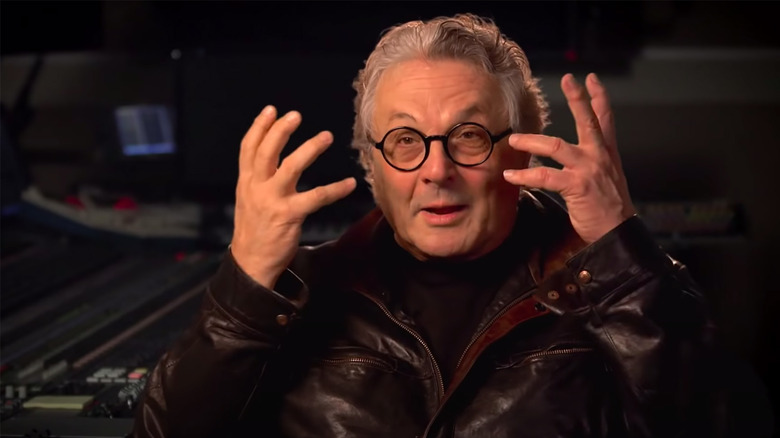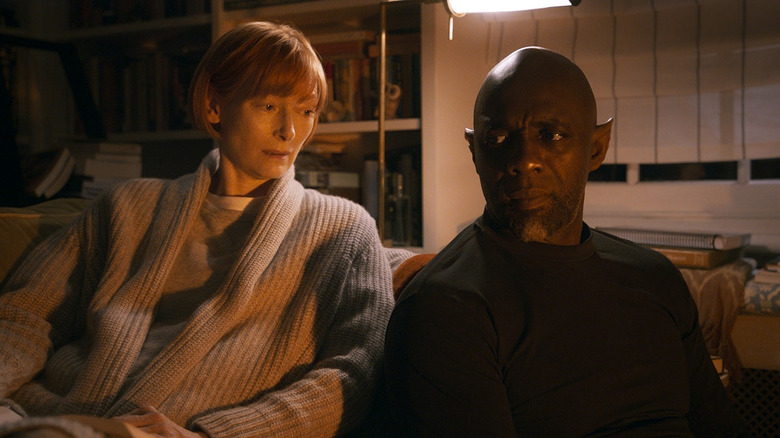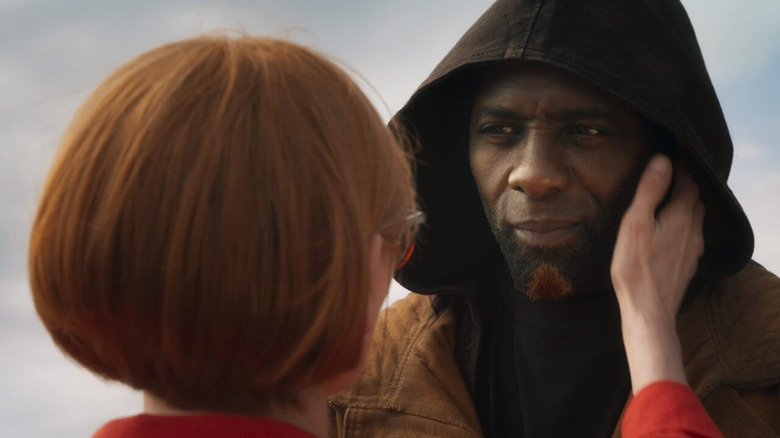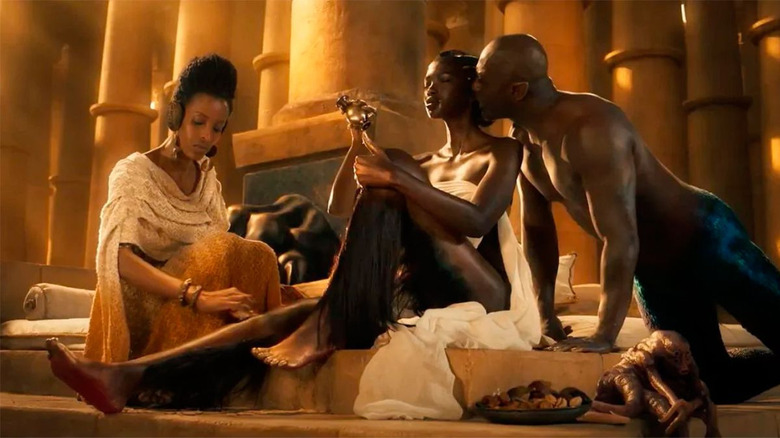George Miller Talks The Sprawling Fairytale Romance In Three Thousand Years Of Longing [Exclusive Interview]
There are no half measures with George Miller. The Australian filmmaker commits everything he has to movies about pigs who wish they were sheepdogs, penguins who wish they were tap dancers, and denizens of post-apocalyptic wastelands who wish only for the next drop of water, the next scavenge-able ghost town, the next souped-up war rig full of guzzolene to ride straight to Valhalla, shiny and chrome. It's been seven years since Miller blazed back onto the scene with the breathtaking "Mad Max: Fury Road," which carved his place in film history as the kind of guy who knows exactly how to squeeze every last drop of adrenaline from every unbelievable action scene. His newest film, the Arabian Nights-influenced fairytale romance "Three Thousand Years of Longing," could not be more different.
"Three Thousand Years of Longing," based on A.S. Byatt's short story "The Djinn in the Nightingale's Eye," spins a tale that spans millennia as a displaced Djinn (a giant Idris Elba) tells fantastical accounts of his lost loves to a dowdy scholar of storytelling (Tilda Swinton), who travels to Istanbul for an academic lecture conference and stumbles upon the Djinn's glass vessel. As he relates three swooningly romantic tales while they sit across from each other in a hotel room, he warns her to be careful with her three wishes, as well as her heart.
The film flows from the desert kingdoms of the Queen of Sheba to the heart of the Ottoman empire, and yet it feels contained and intimate whenever we check back in with our main characters, a world-weary spirit and a human woman inevitably falling in love with him. If it feels like a markedly personal project for a director like George Miller, that's because it is: This film has been decades in the making.
George Miller sat down with /Film to talk about the process of making "Three Thousand Years of Longing," detailing the aspects of the source material and his cast that inspired him to create his fantastical worlds. Read the full interview below.
'It was one of those stories that wouldn't let me go'
This movie is so rich with meaning, and, obviously, there's so much going on. I know the script is based on a book, but could you take me through anything else you were thinking about while making this?
Gosh, hello. First of all, I tend to give long-winded answers.
That's fine. That's great.
I first came across the story when someone gave me a small anthology of fairy tales that A.S. Byatt had written. One of them was a little longer than the others, about 40 pages, called "The Djinn in the Nightingale's Eye." And I read it, and it was one of those stories that wouldn't let me go. Here was a story that, ostensibly, was a conversation between two characters in a hotel room in Istanbul, and the stories that they told each other span 3,000 years. So, already, there was that paradox of something that, in a sense, was small, it was almost a "My Dinner With Andre" type of conversation, really. And yet, it was very expansive. It was a conversation between one character who was highly rational and a creature of reason, and the other was a creature of emotion and desire and passion and so on. And, to some degree, of desperation. It was essentially a fairytale, and it had some profound resonant truths. Also, one of the characters was mortal, like the rest of us, and the other could live indefinitely.
At the core of it, though, because of how the story unfolds, it goes to various central ideas, like, what's the nature of reality? What's real, and what's not real? Why do we tell each other stories and make meaning of a bewildering universe through stories? What's the nature of love? What are the gestures that really define love, one for another, and all of that, in a relatively short story and a relatively short thought. That was the thing that really got me going in the first place.
I remember reading it in the late '90s, and went on to make other films, but always intended to make the film. I was lucky enough to make it with a wonderful cast and crew. I just was so proud of everybody's work. In particular, when I met, in person, Tilda Swinton and Idris Elba in Brazil, I immediately saw them as the characters. I knew their work. I had no idea, other than the characters I'd seen onscreen, who they were. When I actually got to talk to them and had conversations, recreational conversations, I suddenly thought, "Oh my god, they have the vividness and the qualities of these characters." The Venn diagrams of the characters and the actors overlap for me. I was very fortunate that they were engaged enough with it to want to make the film. Really a very fun time for me. Eventually, from there, it was about the process. So that's the long and short of what I went through to make this film.
'So he's thinking as the filmmaker as well as the actor'
They're both so perfect in these roles. I can't imagine anybody else playing these characters, they both work so well together.
I think it comes down to, first of all, what I call "filmmaking actors." In other words, the concern is not only for the work that they have to do, it's for the collaboration between everybody. Both of them, in their own way, were there to make the film so that everyone's work could be enhanced. I mean, just the intellectual firepower, the analysis they both brought to it.
Tilda has a fierce intelligence, and is there, first of all, as an artist, as much as she is as an actor. Idris blew me away. The first conversation we had, the first sentence was, "Look, I'd really like to do this film." And the second sentence was, "Can we shoot all the stories he tells Alithea before we shoot the scenes in the hotel room?" Until he said that, despite having worked on the film for so long, it just didn't occur to me to do that. So he's thinking as the filmmaker as well as the actor. It proved to be by far the best strategy to shoot the film. So we shot all these scenes with the other characters — Sheba, the Ottoman scenes, all the way through before Tilda arrived — and then we finally shot the conversation in the hotel room. Small things like that, which are so self-evident, they contributed so much more.
Most of all, apart from their skills and so on, they both contributed their charisma. That quality in which, on the one hand, they are very accessible as characters, on the other hand, they retain a great reserve of mystery so that you're always intrigued as to where they're going.
'The further back you go in time, the stories are more fantastical'
I loved the Sheba story, and I particularly loved all of the creatures that were in the throne room during those scenes. Where did those designs come from? What kind of conversations did you have to figure out what they would look like?
First of all, the further back you go — and this applies to all storytelling, mythology, and all cultures — the further back you go in time, the stories are more fantastical. The more present stories, and the more recent the stories are, the more they're rooted in reality. We wanted to make it clear that, in the time of Sheba, you can have magical instruments, there were all sorts of creatures. When we got to the Ottomans, a lot of that's based on accurate history, the designs and so on. We were able to basically take it directly out of existing verbatim history. We had a license at the time of Sheba, where there's another really recorded history.
These kinds of things exist in the imagination, as mythological stories always do. So the design was mainly driven by a wonderful English artist, who I had a similar conversation with. He did some wonderful designs for "Fury Road." And I said, what sort of creatures would there be? Maybe there's creatures that are half-fish, half-man, there's all sorts of sizes there, and so on. He's a very gifted artist, and he was able to send us these beautiful concept drawings and artwork. The quintessential one for me was what we call the "Ziraffe," a giraffe with the markings of a zebra. So much of that came out of his imagination.
"Three Thousand Years of Longing" is playing in theaters now.



